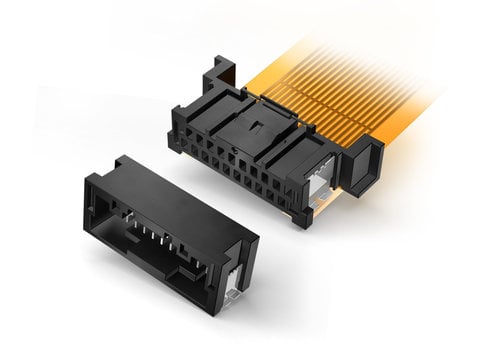20 pins, two rows - and no smarter way for high power connections
Panasonic Industry launches the new double-row CF2 board-to-FPC connector.

For the sake of simplified, time- and cost-efficient assembly, there is no smarter and robust way to connect a PCB with a flexible printed circuit (FPC): Just two parts - a plug and a receptacle - are needed for a reliable, vibration resistant high power connection, making relay wire harnessing sets redundant. These are good news, as the use of daytime running lamps gets more common – let alone the increased usage of battery management systems.
Following the successful launch of the CF1 connector with 4 to 10 pins in one row, Panasonic Industry now announces the new CF2 type coming with 20 pins in two rows, offering other pin con-figurations on request.
“We are glad to serve the automotive market’s demands for clever, reliable and weight-saving connectors now on a wider base with additional pin configurations”, states Carsten Wieber from Panasonic Industry Europe. “Having in mind the electric vehicles’ battery management systems as well as their overall electronic infrastructure are getting more and more sophisticated, we expect the CF2 connector being considered as attractive as the single-row version.”
For its remarkably compact-sized - CF1/CF2 connector family, Panasonic Industry resorts to a unique metal terminal connection structure, making the direct connection between the FPC and the board possible, overcoming poor assembly workability of wire harnesses.
Suitable for automotive applications that require shock, vibration and a 125°C heat resistance, the connector's double-sided contact and inertial lock structure prevent incomplete mating and thus guarantee the utmost operational reliability.
Next to its obvious and highly relevant automotive applications, the CF1/CF2 connectors will also be a modern connector option for non-automotive purposes such as lighting applications, energy stor-age systems and many more.
Key features:
- For Automotive Applications,125 °C heat resistance
- ‚Anti-misoperation bridge structure prevents unintended operation of mating lock
- Contact reliability is preserved by double-sided contact structure
- Inertia lock construction prevents half-mating
- Weight and process cost reduction
Learn more on Panasonic Industry’s latest generation of board-to-FPC connectors here
www.panasonic.com

